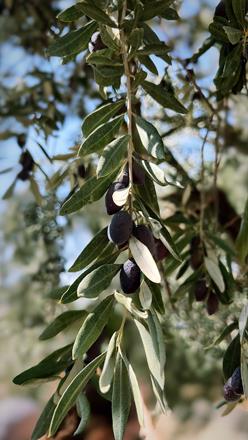
Olive Tree : Levantine Symbol Seriously Endangered By Escalating War
This crisis, as reported by the International Organisation for Migration, has not only worsened the Lebanese humanitarian crisis but also struck at the heart of Lebanon's agricultural sector – its olive industry.
Destruction of Lebanon's olive sector
The loss of over 47,000 olive trees during the critical harvesting season has devastated the livelihoods of more than 110,000 farmers, tearing apart the economic fabric of a country where olives contribute approximately 7 per cent to the agricultural GDP. With 12 million trees covering nearly a quarter of Lebanon's farmland, the destruction of this vital crop is a significant blow to both the economy and the nation's cultural identity.
The devastation extends beyond the olive groves. The Lebanese ministry of environment has reported alarming levels of heavy metals and phosphorus in areas bombarded by Israeli artillery and white phosphorus bombs. These toxic substances pose severe health risks to civilians and have rendered vast areas of land unsuitable for cultivation. Many civilians have already been hospitalised, and the United Nations has documented widespread damage to southern Lebanon's agriculture, including land degradation, chemical contamination and the persistent threat of unexploded ordnance.
White phosphorus: Intentional damage
The use of white phosphorus, a chemical incendiary known for its horrifying effects, has exacerbated the tragedy. According to Human Rights Watch, white phosphorus ignites at 815 C, causing burns that penetrate deep into the flesh, often to the bone, and leading to infections, respiratory damage and organ failure.
Its environmental impact is equally catastrophic: The phosphoric acid released during detonation is highly corrosive, leading to soil acidification, impaired plant growth, and potential water contamination.
The European-Mediterranean Human Rights Monitor has condemned its use as a violation of international humanitarian law, emphasising that its deployment in civilian areas should be strictly prohibited. Despite international prohibitions, the Human Rights Watch has confirmed its use by Israeli forces during military operations in Lebanon and Gaza on October 10, 11, 2023. The Israeli military, however, denies these allegations, insisting that their smoke-screen shells do not contain white phosphorus.
Olive tree: Levantine heritage
The olive tree, an ancient symbol of peace and resilience, holds a unique place in the heritage of the region of the Levant, particularly for Lebanese and Palestinians.
These trees, some over 2,000 years old, have been a part of the Mediterranean landscape for thousands of years and have witnessed the rise and fall of many civilisations, including the Phoenicians, Romans, Byzantines and Ottomans, each of whom left their mark on the region.
The destruction of these trees, deeply intertwined with the cultural and spiritual identity of the Levant, adds a poignant layer to the suffering.“People are connected to olives spiritually: our ancestors planted them, and we are losing them today,” Lebanese Agriculture Minister Abbas Hajj Hassan said to international press.
The toll of the conflict has spread across 60 villages, erasing the livelihoods of countless families and eroding a tradition that has withstood millennia, according to figures from the Lebanese agriculture ministry.
Olives of Palestinian farmers
For Palestinian farmers, who are facing constant threat from Israeli settlers, olives are more than just a source of income –they symbolise their rootedness in their ancestral lands. Since the Nakba in 1948, the olive tree has come to represent Palestinian resilience.
Numerous human rights organisations, including B'tselem, an Israeli organisation focused on the human rights violations in the Occupied Palestinian territories, have documented regular attacks by Israeli settlers on Palestinian farmers. These attacks include preventing them from reaching their lands, stealing their olives and agricultural equipment, and destroying their olive trees –actions that flagrantly violate the UN resolutions.
A broader cultural loss
The origins of olive trees can be traced back to the Levant, where written tablets, olive pits and olive presses reveal their deep historical roots. The Levant is home to some of the oldest olive trees in the world, with a history of cultivation dating back to Early Bronze Age
The olive's journey from the Levant to Greece, Spain and other regions of the Mediterranean ties together the ancient civilisations of the basin, from the Cananeans, Phoenicians, to the Romans, Byzantines and many more.
All these ancient societies thrived on the cultivation of olives, a crop that has remained a staple of Mediterranean life and a symbol of endurance through centuries of conflict and change.
Cultural and environmental toll
The olive tree, which has stood as a symbol of peace, resilience and cultural continuity for millennia, now stands as a testament to the human and environmental toll of conflict.
The ongoing devastation of Lebanon's olive sector is more than just another economic disaster; it is a profound loss for the cultural and historical fabric of the region. These olive trees, deeply rooted in the soil of history, now face a future as uncertain as the people who have nurtured them for generations.
Today, the olive groves of the Levant are facing unprecedented threats. Fires ignited by Israeli bombardment have scorched farmlands, rendering them unsuitable for cultivation and dealing a devastating blow to the region's agricultural economy. This destruction mirrors a broader pattern of violence and environmental degradation that has plagued the region, threatening not just the land, but the very identity and heritage of its people.

Legal Disclaimer:
MENAFN provides the
information “as is” without warranty of any kind. We do not accept
any responsibility or liability for the accuracy, content, images,
videos, licenses, completeness, legality, or reliability of the information
contained in this article. If you have any complaints or copyright
issues related to this article, kindly contact the provider above.


















Comments
No comment